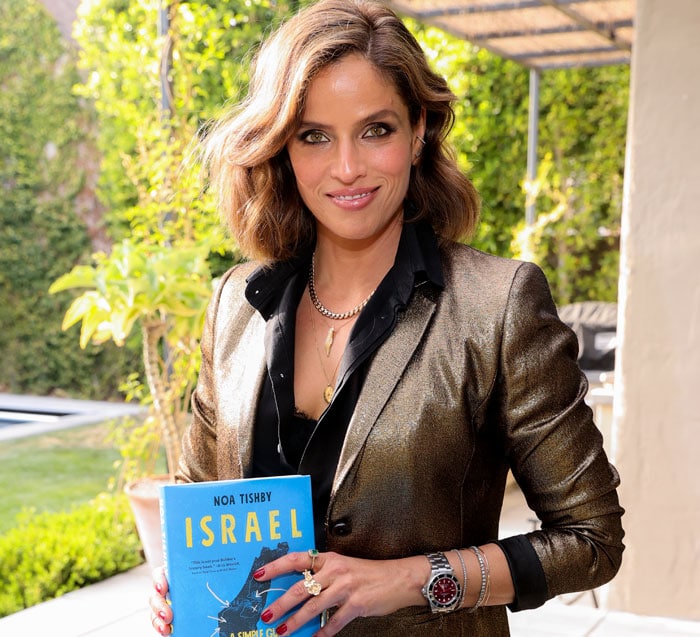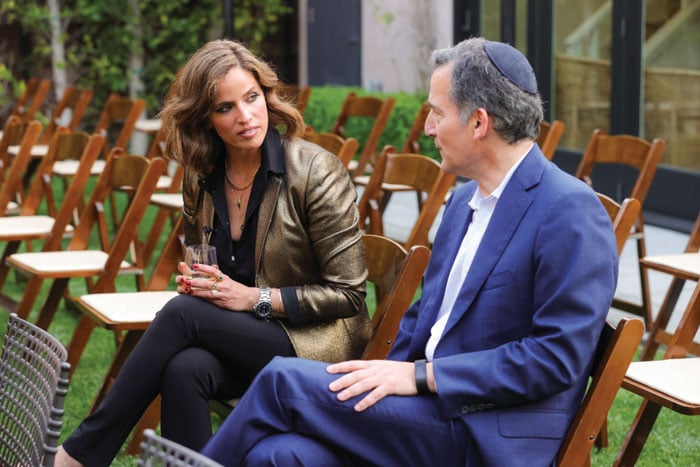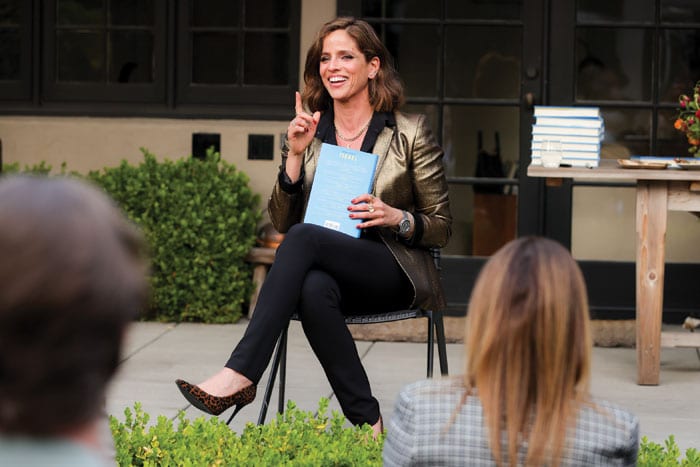 Photo by Rich Fury/Getty Images for Wolman Wealth Management
Photo by Rich Fury/Getty Images for Wolman Wealth Management A lot has happened since the last time the Journal spoke with Noa Tishby in May of this year. Back then, she had just released her debut book, “Israel: A Simple Guide to the Most Misunderstood Country on Earth.” The Journal described the book as “the much needed schooling/scolding for all sides of the conflict.”
Now six months since its release, her book still ranks in the top 10 books in three Amazon categories: no. 3 in Historical Middle East Biographies, no. 5 in Israel and Palestine History Books and no. 8 in Middle Eastern Politics. It has garnered praise across the political spectrum, from Bill Maher to Ben Shapiro.
And then there was an uptick in rockets being fired at Israel. Pundits and politicos turned to Tishby for answers to explain what was going on.
Tishby said that the pace in which her life has picked up has been nothing short of “dizzying.” The last half year has included multiple appearances on national and international television, including “The View’’ and Fox News. She made public rebukes of John Oliver’s omissions in explaining the Israel and Palestinian crisis to his HBO audience. She’s put her acting career entirely on hold to pursue her mission of correcting the misconceptions about Israel to the public. She’s creating new allies, meeting new trolls and is represented by a new agent. Not a day goes by where she isn’t sharing an Instagram story of praise about the book from a new fan.
But Tishby’s daily hustle has remained firm. She’s still up every day at 5:30 a.m. at her home in Los Angeles. She still recharges her internal batteries with yoga and meditation to get ready for a day of keeping up with that dizzying pace of being a prominent Israel advocate, and of course, her top priority: being a mom to her five-year-old son Ari.
“I like waking up before the sun and I like waking up before my son!” she quipped.
The early hours not only give her time to communicate with people back in Israel during their work day hours, but it’s also just the way she has been wired to start her day since she became an actress.
“I’ve been ‘trained’ since I was young, working in the entertainment industry, getting picked up sometimes at three or four in the morning, and it created a connection for me to wake up before sunrise,” she said.
Before publishing “Israel: A Simple Guide” earlier this year, Tishby was primarily known as an actress and producer. She was in her first commercial at age eight in Israel, and received her first drama scholarship at age 14. She served two years in the Israel Defense Forces, and moved to the United States to take her acting career to the next level. By the time Tishby was in her early 30s, she became the first producer to bring an original Israeli television show to the U.S.: the multiple Emmy-nominated HBO show “In Treatment.”
Now at age 44, she has spent slightly more than half of her life in the U.S.
‘As soon as I got the book deal and sat down to write the book, I had such an ‘aha’ moment: it became very clear to me that this is what I was meant to do.’
“As soon as I got the book deal and sat down to write the book, I had such an ‘aha’ moment: it became very clear to me that this is what I was meant to do,” she said of the new trajectory of her work as a full-time Israel advocate. “Everything I’ve been through in the past 20-30 years culminating with this—my life’s work.”
That work is correcting misunderstandings about her homeland. Tishby said that her close community of friends and colleagues had been noticing over the past decade that a “tsunami of awful” was brewing in the public’s view of Israel. Indeed the world is awash in that tsunami these days: The recent rise in antisemitism throughout the U.S., prominent voices making detrimental claims in jest and the BDS movement flourishing on college campuses all fuel Tishby’s daily determination to set the record straight on Israel.
Now that her book’s success has made her one of the go-to people for Israel commentary, Tishby said she sees some hope in these times.
“People are willing to listen and willing to do what they need to do in their communities to change this because we’ve all realized the risk we’re facing if we don’t.”
“It feels like for the first time in many years that people are willing to listen,” she said.
Her anecdotal explanation of how she sees the general population is this: Eight out of 10 people who are faced with questions about Israel, Tishby said, are open-minded. “If you have 10 people, two are completely brainwashed. You can’t reach them [if] they have fully have eaten up the anti-Israel, anti-Jewish propaganda. We shouldn’t try to engage them, and we shouldn’t try to convince them. But out of those 10, eight are on the fence, they’re either pro or completely neutral, they don’t know enough, or they don’t care enough. Those are the people that I’m talking to.”

Tishby has written off the Twitter trolls, the BDS leaders on college campuses and the U.S. Representatives Ilan Omar and Rashida Tlaib, whom Tishby calls out by name. And the people who are spewing antisemitic tropes and lies on social media feeds, she said, are two out of 10.
The one particular thing that keeps her more determined than ever is the complacency about Israel and antisemitism among Jews in the U.S. and Canada.
“We thought antisemitism isn’t a thing anymore. If there is one good thing that has happened throughout the past few months [it’s] that we have woken up.”
“We have been lucky as the Jewish community in America to be able to be complacent,” she said. “We’ve been lucky to think that our problems are over, to be living in America and to experience those freedoms. But we took them for granted—the security, the safety, the bipartisanship, legitimization of Israel as the nation. We thought antisemitism isn’t a thing anymore. If there is one good thing that has happened throughout the past few months [it’s] that we have woken up.”
Tishby has many friends who describe themselves as “culturally Jewish.” This past spring, as conflict erupted in Israel and antisemitic violence dramatically increased in America, they were the most frightened by what was going on—many to an unprecedented degree. She said that a lot of those liberal-minded culturally Jewish friends went about their lives thinking that taking a stand wasn’t necessary. One by one, they reached out to Tishby, and some even read her book. The result of that was that most of these friends have become completely united and engaged.
“We said ‘never again,’ [and] we thought it’s a done deal,” she said. “But now it’s ‘never again!’ with an exclamation point. It’s a call to action all of us have to take, traditional and secular Jews. We need to take ownership of this.”

Two names in Hollywood that Tishby said “have not helped” with the spread of misinformation about Israel this year are comedians Seth Rogen and Sarah Silverman.
Earlier this year, Silverman said, “It’s not antisemitism to criticize a government. I’m fine with BDS as long as it’s clear that you’re boycotting a government, and not a people. When that line gets muddy, that’s when it’s a little scary as a Jew.”
Tishby characterized Silverman as a “bright person with a proud Jewish background (and a sister who is a rabbi),” but still finds her viewpoints problematic.
A common refrain in Tishby’s life in the spotlight over these last few months has been stating and restating that BDS is not about boycotting a government and it’s not about settlements. It’s about being anti-Israel, no matter who is in power.
Tishby said she attempted to have a conversation with Silverman, but received no response from her representatives. (It’s worth noting that recently, Silverman denounced the Squad over their Iron Dome position and said: “Do not defund the Iron Dome. My family lives there. It just seems to prove the point that I didn’t think existed — people really only like Jews if they’re suffering.”)
Rogen is one of Tishby’s common examples of how a safe Jewish community in the U.S. and Canada has enabled many Jews to become complacent and no longer see the threats Jews face worldwide and at home. Rogen commented this year that he was “fed a huge amount of lies” about Israel while growing up Jewish in Vancouver.
Tishby said that she’s “all for comedy,” but even those words used in jest are eventually used against Jews in “a messy kind of way.”
When asked for what a solution could be, Tishby said the top priority is that Jewish education needs to be transformed.
“We are sending our kids to Jewish day school and high school and putting great Jewish values in them, but we are shying away from difficult conversations,” she said. “Then they are showing up on campuses and they are shocked by [the lies about Israel] that they hear for the first time: apartheid, genocide [and] ethnic cleansing. So we have to be able to start the conversation in middle school and address the problematic issues honestly with the kids. Because then they get left out on college campuses completely exposed, and then they think as Seth Rogen said, that they were fed lies [while growing up]. But the moral justification of the existence of the Jewish state does not require us to hide the truth.”
She said that she was raised liberal in Israel, and still considers herself a liberal. But she’s not above praising the Trump administration’s work with the Abraham Accords.
“It’s frustrating to me for people who are liberals to not praise the Abraham Accords,” Tishby said. “Fine, they were done by Trump, and you don’t like Trump, but still acknowledge that they were a brilliant move. BDS is against the Abraham Accords.”
Another big step that Tishby said the Jewish community needs to take is to support the liberal voices in the Muslim world.
“By not criticizing, for example, Sharia law as the earthly state-sponsored manifestation of rape culture, by not saying this out loud as liberals, we are leaving women in the Muslim world, and liberals in the Muslim world that are trying to transform their countries from within, we’re abandoning them,” she said.
Over the last few months, Tishby has been inspired by the plethora of phone calls from her non-Jewish friends who were shocked by what was happening. And it sounded like this: “I don’t know about the region, and I’m pretty sure Israel is not an apartheid state, and it’s not a genocide state, so what am I seeing on my social media right now?”
Clearly, the hate and aggression towards Israel surprised a lot of people, not just inside the Jewish community.
Now, Tishby plans to be doing even more in the coming months. And it has gone beyond just a simple book tour.
“It’s always been the path, the thing I’ve been most passionate about. And now I’m lucky to have a book and a platform to be able to do that.”
“What would be more important, more exciting, more valuable, than doing this work?” she said. “Nothing! Nothing is more interesting to me. It’s always been the path, the thing I’ve been most passionate about. And now I’m lucky to have a book and a platform to be able to do that. And I’m very supported by the community. People are willing to listen and willing to do what they need to do in their communities to change this because we’ve all realized the risk we’re facing if we don’t.”























 More news and opinions than at a Shabbat dinner, right in your inbox.
More news and opinions than at a Shabbat dinner, right in your inbox.